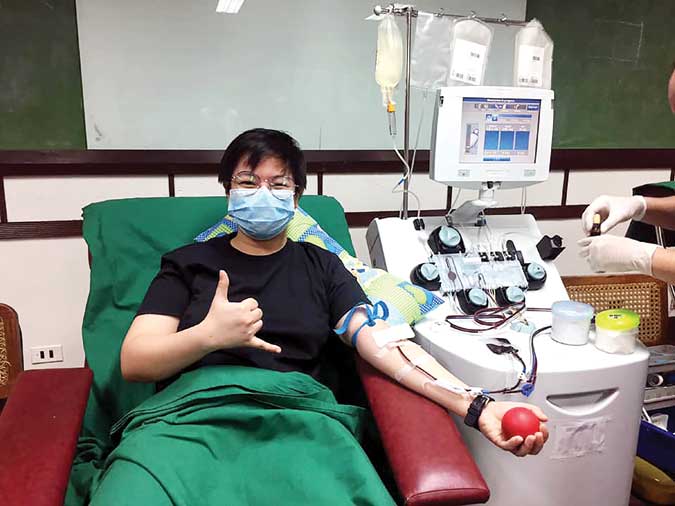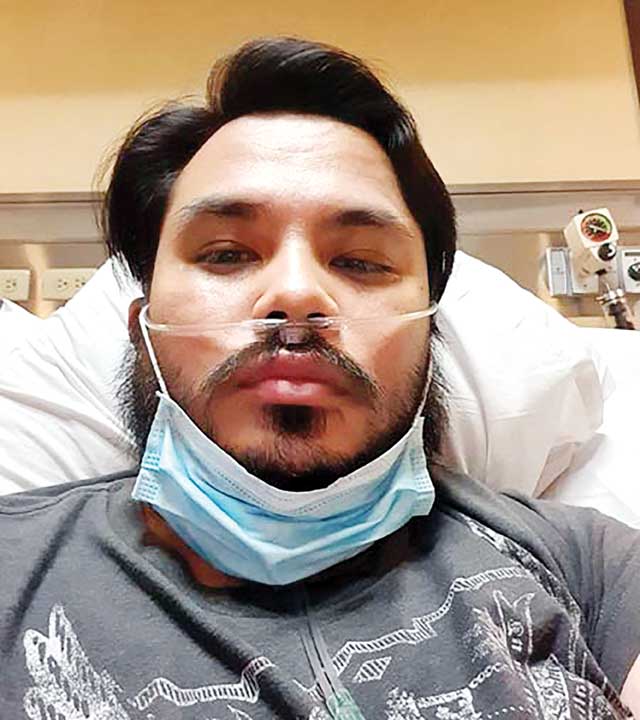By Hannah Mallorca
Features Writer, The Philippine STAR
Despite the lingering fear and anonymity, COVID-19 (coronavirus disease 2019) survivors are now living hopeful lives.
Three of them bravely told their tales of how the virus has changed the course of their physical, mental, and overall health. (Caution: Details in this story may trigger fear, stress, and anxiety among other COVID-19 survivors and suspected, probable and positive case individuals.) As of April 29, there are 8,212 confirmed COVID-19 cases in the Philippines. Despite this, patients seek to live another day — hoping to find their way back home.
PH4: CARLO NAVARRO
Seven days after a family trip to Japan, Mr. Navarro experienced chills and a low-grade fever of 37.7°C. The hospital said his symptoms were mild, but he insisted to get tested. The fever eventually subsided, but he experienced muscle pain and dry cough.
He soon received a call from the Department of Health (DoH) confirming that he was positive for COVID-19. Immediately, he was whisked away by an ambulance to the Research Institute for Tropical Medicine (RITM).
“I suspect I got infected during our family’s February 25 flight back home from Haneda to Manila. Behind my seat was a man coughing vigorously,” Mr. Navarro shared. “We thought we were making up for the risk by wearing masks, washing and rubbing our hands with alcohol and essential oil, and wearing disposable latex gloves which we regularly changed and threw away.”
When Mr. Navarro was confirmed to be positive, the Philippines only had three positive cases. They were Chinese tourists from Wuhan.
“This made it doubly frightening; it was surreal.My first thought was that my daughter, wife and helpers might get infected. Thankfully, they all tested negative,” Mr. Navarro recounted. His family was frightened as well. His daughter cried a lot in the beginning, while his wife remained strong.
Mr. Navarro experienced diarrhea and fever on the sixth day of his confinement. “At that point, my doctors had suspected pneumonia, which was confirmed the following day. I (also) began to lose my appetite and vomited everything I ate,” he shared.
However, it wasn’t the treatment and physical pain that put more strain on Mr. Navarro’s health — it was the psychological effects of the virus. “I was vomiting endlessly and had diarrhea probably due to stress,” he shared. According to the World Health Organization (WHO), the pandemic has also caused a crisis on mental health worldwide.
“It was terrifying to hear wails and cries from adjoining rooms when other patients would not make it through the night,” Mr. Navarro admitted. Despite this, his battle with COVID-19 strengthened his faith in God.
After 10 days in confinement, Mr. Navarro was discharged. He still experiences cough but his doctor said it is the effect of his lungs recovering from pneumonia. He was notified of his latest test result, which was negative, two weeks after his discharge.
PH# UNKNOWN: KAI SORIANO
Ms. Soriano’s story is a different one since she works on the frontline to defend patients from the virus.

“Working in the emergency room means we handle countless patients with differing diagnoses. Before the implementation of ECQ, there was a sudden influx of patients tagged as PUI. Therefore, pinpointing a specific patient as my source would be difficult,” she shared.
However, the last patient she handled was experiencing shortness of breath, although it seemed he was suffering from a myocardial infarction or heart attack. He eventually passed away — it turned out he was COVID-19 positive.
Ms. Soriano thought she was only experiencing a regular flu when she got tested. “I had fever and diarrhea, so I considered it just a normal stomach flu. What was quite unusual was I didn’t have a sense of taste and smell. That’s why it was quite a surprise when I saw my results,” she admitted.
Ms. Soriano and her family kept her condition a secret to avoid unnecessary panic. However, she was not confined in a hospital and was placed under strict quarantine.
“Every (person) living in our house was not permitted to go outside. We were discriminated,” Ms. Soriano recalled. “One day, I woke up to soldiers banging on our gate (while) yelling (through a) megaphone that I was a COVID-19 positive patient. It was then proceeded by them surrounding our house with yellow ‘Caution’ tapes.”
On April 6, the Metro Manila Council urged local ordinances to penalize acts of discrimination and violence against frontline workers, overseas Filipino workers and individuals under suspect, probable and positive cases. President Rodrigo R. Duterte and the Inter-agency Task Force for the Management of Emerging Infectious Diseases also urged local government units, police and military to prohibit discriminatory acts.
Ms. Soriano shared that she fought emotionally since she was also worried about her family’s safety. “What made home quarantine difficult was that I had to isolate myself in a separate room. It wasn’t comfortable, but I had no other choice than to stay inside,” she added.
When Ms. Soriano was declared as COVID-19-free, she was advised to boost her immune system by drinking water, taking vitamins, and eating nutritious food.
For Ms. Soriano, the discrimination that she and her family experienced was due to lack of awareness.
“Health education and information dissemination is the primary responsibility of each LGU and health worker, so they must be properly oriented to not add more confusion and unnecessary stress. There must also be a uniform process for all of COVID-related cases that may arise,” she said.When asked about her patient number, Ms. Soriano admitted that it was never relayed to her.
PH358: ROGELIO BUENO, JR.
Mr. Bueno admitted that he was in denial when he showed symptoms. On the other hand, his wife Joanna was worried about his condition since he was already experiencing fever, weakness, and difficulty in breathing.

“Joanna was telling me, ‘baka (COVID-19) na yan.’ I was in denial, ‘malakas katawan ko and ang taba ko, ‘di ako tatablan niyan’ was my response to my wife,” Mr. Bueno shared in his Facebook post.
According to Mr. Bueno, his symptoms quickly progressed from mild to severe. He visited various hospitals, was initially diagnosed with systemic viral illness and was prescribed various medicines as a result.
It wasn’t until the sixth hospital where Mr. Bueno got tested for COVID-19, and received his results. “The nasal swab test was very painful, it was a long stick that is inserted very deep per nostril. The throat swab test is more tolerable, thought it can still make you gag,” he admitted.
Mr. Bueno admitted that he was suffering from pre-existing asthma, hypertension and diabetes prior to being tested. Since he came from a family of doctors, they knew that his existing illnesses will complicate his condition.
“It’s hard for them because, as doctors, they go to the hospital to check their patients, but they can’t check on me since I was in isolation. At the same time, they were also put in quarantine after being exposed to me,” he added.
Like Mr. Navarro, Mr. Bueno also experienced anxiety as he dealt with the disease. “I was feeling hopeless and was preparing myself for the worst. Regrets were on my mind,” he admitted. He thought that he was not ready for his wife to be a widow at a young age.
“Good thing my wife was with me. She helped me pull through and just get through each day by telling me not to give up, by praying with me and constantly reminding me to have faith in God and that I will be healed,” he shared.
Eventually, Mr. Bueno was declared to be COVID-19-free. To maintain his condition, he observed health precautions such as taking antibiotics and checking his vital signs regularly. Despite the experience, he is grateful to have a second chance to live.
“I think (health sectors) should appreciate the frontliners more because they are putting their lives at stake (every day). I think they should be protected as well,” Mr. Bueno said.
Recovering from the virus is only the beginning of another battle for many survivors. According to the American Association for the Advancement of Science, many are likely to deal with the virus’ lingering effects and the treatments used to overcome it.
Despite this, survivors remain hopeful. “COVID-19 is not a death sentence. Since our immune systems can defend it, it is important to stay strong not just physically, but also emotionally, psychologically, and spiritually,” Mr. Navarro said.
Having the second chance to live was not easy for the three survivors. But they continue to live, hoping their stories can help patients find their way home, too.


